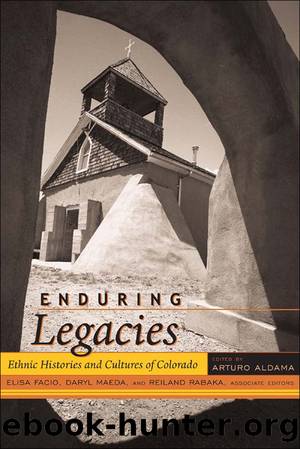Enduring Legacies by Arturo J. Aldama & Elisa Facio & Daryl Maeda & Reiland Rabaka

Author:Arturo J. Aldama & Elisa Facio & Daryl Maeda & Reiland Rabaka
Language: eng
Format: epub
Publisher: University Press of Colorado
Published: 2011-08-14T16:00:00+00:00
NOTES
1. The Colorado Statesman, February 18, 1938, 1, col. 1. Mann speaks here about Alva B. Adams and Edwin C. Johnson, both Democrats who voted to close debate on an anti-lynching bill that was a chief topic of concern for Black people generally and the NAACP specifically.
2. I first became aware of these writings while researching the history of Denver’s Black community coeval with the city’s founding in 1858.
3. Sometimes a particular subject was the thrust of the entire column. Often he addressed several topics, tying them together at the end. I have had access to all of the columns except when there was a missing issue of the paper on the microfilm or the image itself was so badly damaged that it was unreadable.
4. Mann was a prolific correspondent with a wide range of persons and parties, as letters he received that are contained in his papers make clear. Unfortunately, he does not appear to have kept copies of letters he sent that would provide additional insight into his thinking about the issues that initiated the replies he received.
5. While there were Black Democrats from the nineteenth century onward, African Americas as a group did not shift from the party of Lincoln until the early 1930s. Mann is clear, in describing himself, that he began his political life as a Republican and expected to remain one until he died.
6. May 12, 1969, 54.
7. New Georgia Encyclopedia, www.georgiaencyclopedia.org/nge/Article.jsp?id=h–1671.
8. His hospitalizations are periodically reported in the “locals” column of the Statesman, especially throughout the 1920s.
9. Mann’s papers are housed in the Blair-Caldwell African American Research Library. This branch of the Denver Public Library was dedicated on April 26, 2003, and is located on Welton Street, the longtime main thoroughfare of Black Denver. Hereafter cited as Mann Papers.
10. The “society” column of November 1, 1919, reports that Mann “has returned with his wife to their home.” The same column dated March 6, 1920, marks his return, noting that he “has decided to cast his lot on the side of the Westerner and make Denver his permanent home.”
11. See, for example, Bill Douglas, “Wartime Illusions and Disillusionment: Camp Dodge and Racial Stereotyping, 1917–1918,” Annals of Iowa 57, 2 (Spring 1998): 111–134.
12. It is of interest that Mann talks about being permanently disabled from his war injuries and that medical experts believed he was not long for this world.
13. The Denver Post, October 10, 1974, 55.
14. According to his obituary published in the Post, he began as an inspector and retired “as a senior clerk in the services department in 1956.”
15. The Colorado Statesman, August 5, 1938, 1, col. 5: “The friends of Lt. Earl W. Mann are pleased to learn that he is preparing to run for the lower house of the Legislature this coming election, on the Republican ticket.”
16. A news report published on September 13, 1940, in The Colorado Statesman noted that Mann garnered 17,447 votes in the primary, making him eighth in a field of fifteen nominated.
17. Isetta Crawford Rawls,
Download
This site does not store any files on its server. We only index and link to content provided by other sites. Please contact the content providers to delete copyright contents if any and email us, we'll remove relevant links or contents immediately.
| Africa | Americas |
| Arctic & Antarctica | Asia |
| Australia & Oceania | Europe |
| Middle East | Russia |
| United States | World |
| Ancient Civilizations | Military |
| Historical Study & Educational Resources |
Goodbye Paradise(2949)
Men at Arms by Terry Pratchett(2401)
Tobruk by Peter Fitzsimons(2055)
Pirate Alley by Terry McKnight(1906)
Arabs by Eugene Rogan(1833)
Borders by unknow(1779)
Belonging by Unknown(1458)
The Biafra Story by Frederick Forsyth(1318)
It's Our Turn to Eat by Michela Wrong(1299)
Botswana--Culture Smart! by Michael Main(1234)
A Winter in Arabia by Freya Stark(1219)
Gandhi by Ramachandra Guha(1191)
Coffee: From Bean to Barista by Robert W. Thurston(1178)
Livingstone by Tim Jeal(1150)
The Falls by Unknown(1139)
The Source by James A. Michener(1128)
The Shield and The Sword by Ernle Bradford(1097)
Egyptian Mythology A Fascinating Guide to Understanding the Gods, Goddesses, Monsters, and Mortals (Greek Mythology - Norse Mythology - Egyptian Mythology) by Matt Clayton(1084)
Africa: Altered States, Ordinary Miracles by Richard Dowden(1077)
